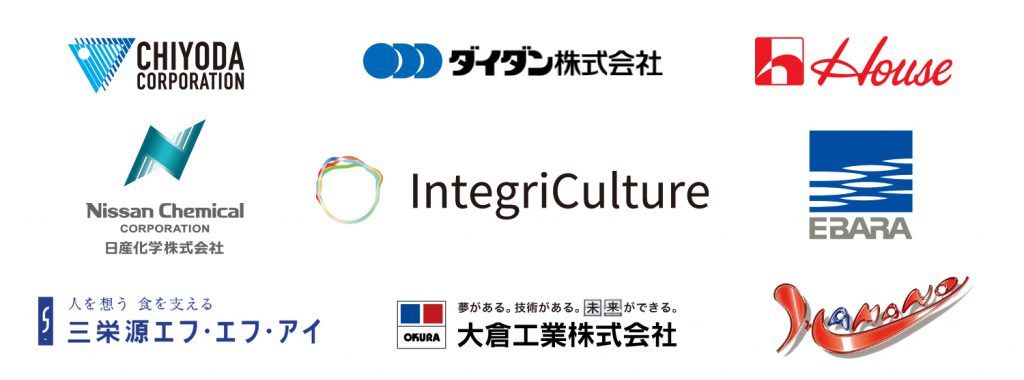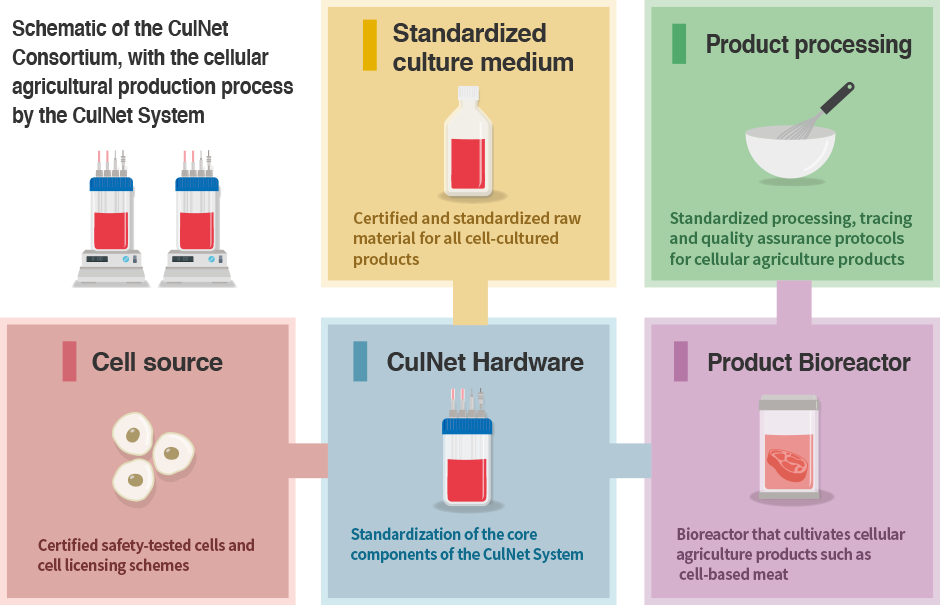"CulNet Consortium" moves into full swing with IntegriCulture at the helm
- A future where cellular agriculture enters the mainstream for meat, cosmetics, nutraceuticals, and materials -

TOKYO, JAPAN – A cellular agriculture pioneer IntegriCulture Inc. has been organizing the “CulNet Consortium”, an open innovation platform for cellular agriculture. With 12 businesses now on board, the consortium officially launched on April 1, 2021.
The project builds platforms that assist cellular agriculture to enter the mainstream in food, materials and other sectors.
■ Purpose of the Consortium
The global population is set to reach 10 billion by 2050, and conventional methods of supplying protein are expected to be unable to meet the demand. Although alternative protein sources like plants and other sources have already gained wide recognition, the idea of producing meat itself by cell culture technology is highly anticipated. There have been multiple attempts of cellular agriculture in different countries, but most remained only on small scales. There are still numerous problems that need solutions such as cost, safety, and production scale. The consortium was established to collaboratively solve these problems through open innovation. IntegriCulture Inc. collaborates with major companies from different sectors including scaffold, bioreactor and medium, to build a whole cellular agriculture supply chain.
■ Participants (as of June 17 in no particular order)
IntegriCulture Inc.
EBARA CORPORATION
Okura Industrial Co., Ltd.
San-Ei-Gen F.F.I., Inc.
DAI-DAN CO., LTD.
Chiyoda Corporation
Nissan Chemical Corporation
HOUSE FOODS GROUP INC.
HAMANO PRODUCTS. Co. Ltd.
Aquaticell
Two other company
■ About the CulNet Consortium
The vision of the CulNet Consortium is an open cellular agriculture infrastructure that is accessible by everyone. Through open innovation, we aim to develop hardware, consumables, and production and distribution methods for the CulNet™ system by collaborating with companies in Japan and overseas in the five fields listed below.

Food applications of cellular agriculture require regulatory compliance in their raw ingredients. Other challenges include large-scale supply of culture medium and scaling of the cell culture process. We will conduct multiple joint R&D projects with each member. The IP generated from the individual R&D project will be shared among the participating members. The members can include such IP in their own businesses.
The common precompetitie results obtained in the consortium will be shared among members. We plan to progressively harmonize technical standards to help create a food system capable of delivering safe, reliable products and simultaneously encouraging more businesses to join.
Fields where the consortium actively pursues open innovation
The consortium is steadily pushing ahead with development and standardization in the following areas:
Standardized culture media: Recipes that are fundamentally different from the existing media (basal media). Basal media are the raw material for all cultured cell products, and a different type is required for each kind (food, material, medical, etc.).
CulNet system hardware: Hardware that lets people use the CulNet system across a broad spectrum of uses, whether it’s in mass production or just at home.
Product bioreactors: Bioreactors that are used to make things like the products’ edible parts. We estimate that a variety of animals used as agricultural products will be a source for the cells.
Cell product processing: The process control that is needed to meet the products’ processing and safety requirements (cell components and culture supernatant).
Cell sources: The process that is used to extract and culture cells from livestock and fishery resources and the systems that enable the whole sequence of processes to be completed right where the cell sources are produced—tailoring them to their intended use, source animal species, etc.
■Comments by the member companies
Makoto Nakamura, Executive Officer and General Manager of the Innovation Division, DAI-DAN CO., LTD.
“We are going to participate in developing the foundations of the next-generation food systems, and contribute to solving social issues.”
Yukio Nanbu, General Manager of Marketing Operations, EBARA CORPORATION
“Endorsing IntegriCulture’s policy of tackling food issues by building an infrastructure of cellular agriculture, we have decided to participate in the consortium. We’ll strive to contribute to the development and rollout of the CulNet system through all the fluidics and control systems technology EBARA has cultivated since it was founded.”
Keiichi Hamano, President and CEO, HAMANO PRODUCTS. Co. Ltd.
“We’ve been taking on challenges toward solving a broad range of social issues through our manufacturing capability. In particular, the current food systems have many issues that need to be solved such as environmental footprint and health of the consumers. We believe solving them is key to humankind’s future survival and development. In CulNet, IntegriCulture has developed a technology that’ll help bring about a society characterized by sustainability and well-being. We’ll contribute to the development of cellular agriculture by applying the agility and flexibility that small and medium-sized manufacturing companies possess. We’ll also bring to bear our knowledge, experience, and technology regarding making things from scratch—assets we’ve cultivated through the support we’ve provided to help more than 200 startup companies.”
■ About the CulNet System
The CulNet System is a general-purpose large-scale cell culture platform technology capable of producing a broad range of cell-cultured products such as cultivated meat and leather.
The patented technology mimics the intercellular interactions occurring in natural animal bodies to culture any animal cells at a large scale at low cost. The applications of the technology beyond cell-cultured meat, include extracts and materials for cosmetics. We have already demonstrated at a laboratory scale automated culture of various cell types and production of serum components. We have slashed the cost of cell culture by eliminating the use of costly fetal bovine serum and growth factors and replacing them with cultured serum internally produced by co-cultured cells.
